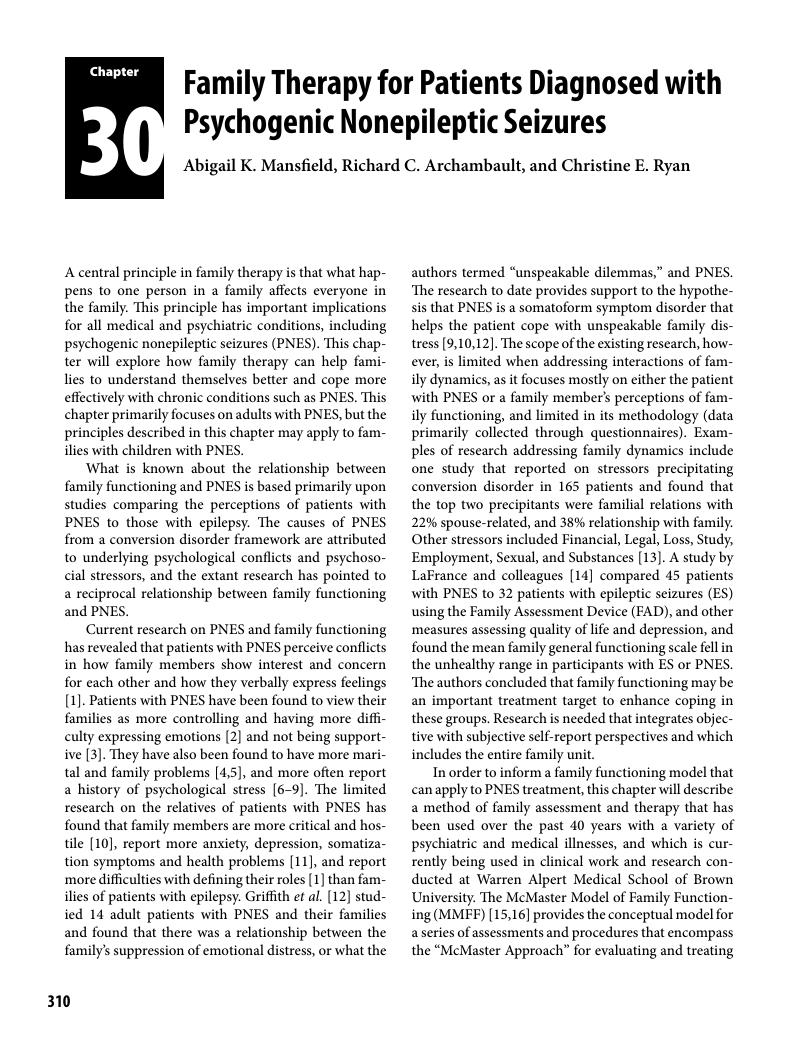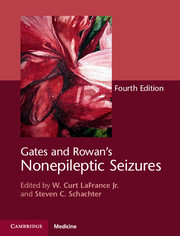Book contents
- Gates and Rowan's
- Gates and Rowan's Nonepileptic Seizures
- Copyright page
- Contents
- Contributors
- Preface
- Acknowledgements
- Video EEGs and Video Clips
- Dedication for Dr. A. James Rowan
- Dedication for Dr. John R. Gates
- In Remembrance of Dr. A. James Rowan
- In Remembrance of Dr. John R. Gates
- Section 1 Recognition, Diagnosis, and Impact of Nonepileptic Seizures
- Section 2 Nonepileptic Seizures: Culture, Cognition, and Personality Clusters
- Section 3 Psychiatric and Neuropsychological Considerations in Children and Adolescents with Psychogenic Nonepileptic Seizures
- Section 4 Psychiatric and Neuropsychological Considerations in Adults with Psychogenic Nonepileptic Seizures
- Section 5 Treatment Considerations for Psychogenic Nonepileptic Seizures
- Chapter 24 Historical Approaches to Treatments for Psychogenic Nonepileptic Seizures
- Chapter 25 Managing Psychogenic Nonepileptic Seizures in Patients with Comorbid Epilepsy
- Chapter 26 Models of Care
- Chapter 27 Who Should Treat Psychogenic Nonepileptic Seizures?
- Chapter 28 Designing Treatment Plans Based on Etiology of Psychogenic Nonepileptic Seizures
- Chapter 29 Cognitive Behavioral Based Treatments for Psychogenic Nonepileptic Seizures
- Chapter 30 Family Therapy for Patients Diagnosed with Psychogenic Nonepileptic Seizures
- Chapter 31 Group Treatments for Psychogenic Nonepileptic Seizures
- Chapter 32 Pharmacological Treatments for Psychogenic Nonepileptic Seizures
- Chapter 33 Training in Treatment of Psychogenic Nonepileptic Seizures
- Chapter 34 The Biology of Psychogenic Nonepileptic Seizures
- Chapter 35 Care Models and Coding for Nonepileptic Seizures
- Appendix: Care Coordination Treatment Plans for Patients with Psychogenic Nonepileptic Seizures (PNES)
- Index
- References
Chapter 30 - Family Therapy for Patients Diagnosed with Psychogenic Nonepileptic Seizures
from Section 5 - Treatment Considerations for Psychogenic Nonepileptic Seizures
Published online by Cambridge University Press: 18 May 2018
- Gates and Rowan's
- Gates and Rowan's Nonepileptic Seizures
- Copyright page
- Contents
- Contributors
- Preface
- Acknowledgements
- Video EEGs and Video Clips
- Dedication for Dr. A. James Rowan
- Dedication for Dr. John R. Gates
- In Remembrance of Dr. A. James Rowan
- In Remembrance of Dr. John R. Gates
- Section 1 Recognition, Diagnosis, and Impact of Nonepileptic Seizures
- Section 2 Nonepileptic Seizures: Culture, Cognition, and Personality Clusters
- Section 3 Psychiatric and Neuropsychological Considerations in Children and Adolescents with Psychogenic Nonepileptic Seizures
- Section 4 Psychiatric and Neuropsychological Considerations in Adults with Psychogenic Nonepileptic Seizures
- Section 5 Treatment Considerations for Psychogenic Nonepileptic Seizures
- Chapter 24 Historical Approaches to Treatments for Psychogenic Nonepileptic Seizures
- Chapter 25 Managing Psychogenic Nonepileptic Seizures in Patients with Comorbid Epilepsy
- Chapter 26 Models of Care
- Chapter 27 Who Should Treat Psychogenic Nonepileptic Seizures?
- Chapter 28 Designing Treatment Plans Based on Etiology of Psychogenic Nonepileptic Seizures
- Chapter 29 Cognitive Behavioral Based Treatments for Psychogenic Nonepileptic Seizures
- Chapter 30 Family Therapy for Patients Diagnosed with Psychogenic Nonepileptic Seizures
- Chapter 31 Group Treatments for Psychogenic Nonepileptic Seizures
- Chapter 32 Pharmacological Treatments for Psychogenic Nonepileptic Seizures
- Chapter 33 Training in Treatment of Psychogenic Nonepileptic Seizures
- Chapter 34 The Biology of Psychogenic Nonepileptic Seizures
- Chapter 35 Care Models and Coding for Nonepileptic Seizures
- Appendix: Care Coordination Treatment Plans for Patients with Psychogenic Nonepileptic Seizures (PNES)
- Index
- References
Summary

- Type
- Chapter
- Information
- Gates and Rowan's Nonepileptic Seizures , pp. 310 - 324Publisher: Cambridge University PressPrint publication year: 2018



